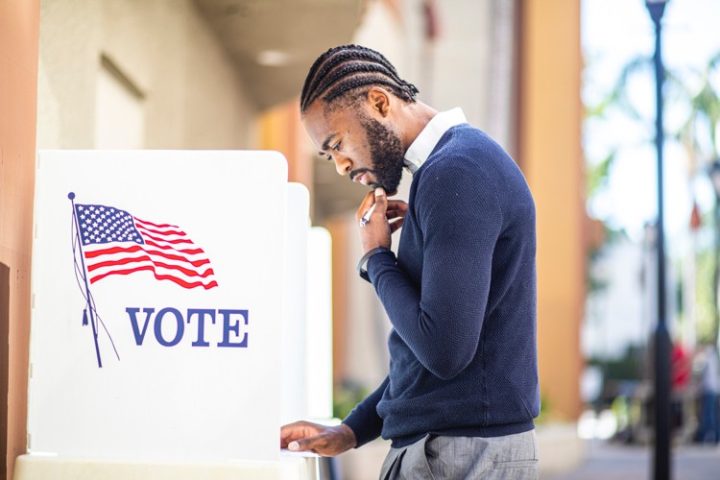
With “equality” passé and the new buzzword being “equity,” racial discrimination is back with a vengeance. The latest example is an academic who wants black Americans’ votes valued at twice those of their white countrymen — as a form of reparations.
Assistant professor Brandon Hasbrouck, who teaches criminal law, race relations law, and critical theory at Washington and Lee University School of Law, is not exactly original. Writing in the Nation last week, his idea closely mirrors a 2015 proposal made by Theodore Johnson, a senior fellow at the Brennan Center for Justice. Johnson, however, was willing to settle for blacks’ votes being worth 5/3rds whites’.
As for Hasbrouck, he unsurprisingly mentions that one “core problem [with our system] is the Electoral College,” but his isn’t the usual leftist complaint. He writes that “Wyoming, which has just 580,000 residents and is 93 percent white, gets three electors because of its two senators and one representative in the House.”
“By comparison, Georgia’s Fifth Congressional District — which includes Atlanta, has 710,000 residents, and is 58 percent Black — has no dedicated electors or senators,” Hasbrouck continues, and this is interesting, then concludes the sentence with, “and can only occasionally overcome the mostly white and conservative votes from elsewhere in the state.”
So the professor begins his examples with what the reader would expect will be the typical state-to-state comparison, but then transitions into an intra-state city-country comparison. The method to his madness, of course, is that he’s consistent in making a rough black-white comparison. In his world, it’s not that all Pennsylvanians’ votes are “worth less” than Wyomingites’ (a situation remedied by moving to Wyoming, if this really bothers one). Everything is racial.
(We could also point out that with vote fraud being mainly a Democrat, big-city phenomenon — in places such as Atlanta — these cities’ participating voters essentially already have a disproportionate number of votes.)
Hasbrouck also complains that “even with overwhelming Black support — 94 percent of Detroit voted for Biden! — the outcomes in Georgia, Michigan, Wisconsin, and Pennsylvania were worryingly close” (actually, the election was worryingly stolen). Apparently, any system giving Republicans a chance in swing states and not ensuring Democrat one-party rule is unjust by the professor’s lights.
Of course, among the many problems with Hasbrouck’s absurd idea is determining who’s black. Will the old one-drop rule apply, perhaps updated to Liz Warren’s 1/1,024th standard?
Counting blacks’ votes double also wouldn’t sit well with other minorities, but the professor has that covered, sort of. He says that American Indians’ votes should also count twice, along with anyone who has “suffered similar disenfranchisement.” He doesn’t specify whom this would be. But given that leftists might have trouble with their “intersectionality” schemes if Hispanics, Asians, the LGBT crew et al. weren’t included, and given that those groups also vote Democrat, perhaps he means anyone who’s not a straight white Christian.
Hasbrouck disgorges other nonsense, too. He claims that the diminution of black voting influence “is all by design,” which means that, magically, the Founders managed the Machiavellian suppression of something whose existence they couldn’t even foresee (blacks’ suffrage wouldn’t become reality until after the War Between the States).
In the next line Hasbrouck avers that the “Constitution’s framers set up the Electoral College to protect the interests of slave states.” This is a now-very popular myth among leftists, one legal scholar Jonathan Turley debunks here.
But there’s something yet perhaps unmentioned about Hasbrouck’s “remedy.” “Without sufficient voting power, Black communities receive substandard education, and politicians are free to appoint judges who sanction mass incarceration, abusive policing, and electoral disenfranchisement,” he writes. “Vote reparations would empower us to replace oppressive institutions with life-affirming structures of economic, social, and political equality.”
Yet as the late Professor Walter E. Williams pointed out in June, in many of the most socially dysfunctional cities today “blacks are mayors, often they dominate city councils, and they are chiefs of police and superintendents of schools.”
Atlanta, which Hasbrouck cites, is a prime example. It has a black mayor, police chief, district attorney (Fulton County), and more. Yet Hasbrouck seems dissatisfied with such places’ education, policing, elections, and prosecutorial decisions — local matters all.
In other words, these things are bad for big-city black Americans despite governance by black officials for whom they voted. So question:
Why, then, should we think that weighing their votes more heavily so their electoral decisions could be effected statewide or nationwide would make their lives better? Would giving Atlanta-like officials higher office and greater power magically enhance their wisdom?
So could Hasbrouck’s insane proposal gain traction? I mean, “one man, one vote” is as American as apple pie, right? Well, not exactly — anymore.
In 2010 already, a federal judge ruled that the elections in the village of Port Chester, New York, were illegal because no Hispanic had ever been voted in as a trustee (even though Hispanics were only 20 percent of the voting-age population). The remedy?
Give every village resident six votes. (Yeah, you read that right. Story here.)
Of course, Hasbrouck’s proposal isn’t the same thing. This said, my many years of observing an increasingly upside-down world has taught me to never bet against crazy.



